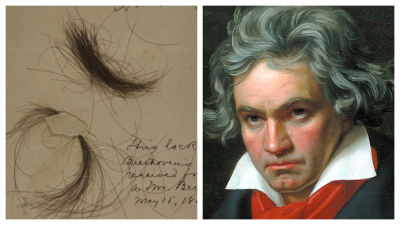Cambridge scientists sequence Beethoven's genome by using locks of composer's hair

Scientists have analysed five locks of what is believed to be Beethoven's hair to sequence the genome of the composer.
An international team led by Cambridge University analysed strands of hair from eight locks in public and private collections in a bid to shed light on Beethoven's health problems.
Five locks were deemed "authentic" by the researchers and came from a single European male.
Ludwig van Beethoven was born in 1770 and died in Vienna in 1827 aged just 56.
The scientists discovered it is likely that Beethoven had a genetic predisposition to liver disease and a hepatitis B infection, combined with his broadly accepted alcohol consumption, that contributed to his death.
Tristan Begg, of Cambridge University, said: "We can surmise from Beethoven's 'conversation books', which he used during the last decade of his life, that his alcohol consumption was very regular, although it is difficult to estimate the volumes being consumed.
"While most of his contemporaries claim his consumption was moderate by early 19th century Viennese standards... this still likely amounted to quantities of alcohol known today to be harmful to the liver.
"If his alcohol consumption was sufficiently heavy over a long enough period of time, the interaction with his genetic risk factors presents one possible explanation for his cirrhosis."
Johannes Krause from the Max Planck Institute of Evolutionary Anthropology in Germany said: "We cannot say definitely what killed Beethoven, but we can now at least confirm the presence of significant heritable risk and an infection with hepatitis B virus."
Mr Begg added: "Taken in view of the known medical history, it is highly likely that it was some combination of these three factors, including his alcohol consumption... but future research will have to clarify the extent to which each factor was involved."
The composer also suffered progressive hearing loss, which began in his mid to late 20s and led to him being functionally deaf by 1818.
Investigation of the hair samples did not reveal a simple genetic origin of Beethoven's hearing loss.
Mr Begg said: "We hope that by making Beethoven's genome publicly available for researchers, and perhaps adding further authenticated locks to the initial chronological series, remaining questions about his health and genealogy can someday be answered."
Want a quick and expert briefing on the biggest news stories? Listen to our latest podcasts to find out What You Need To Know